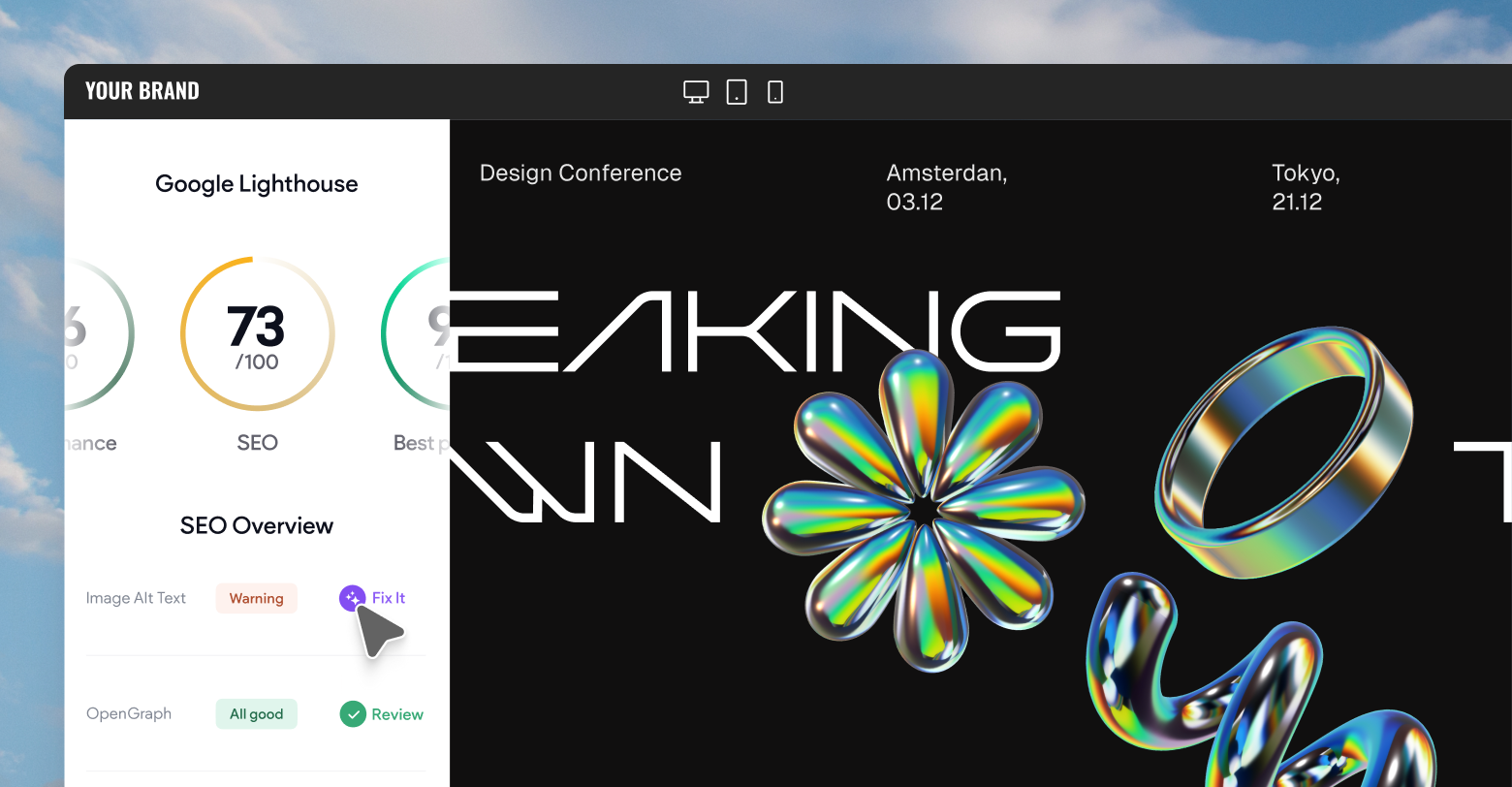There is a centuries-old philosophical question:
'If a tree falls in a forest and no one is around to hear it, does it make a sound?’ In today’s digital world, the modern equivalent might be:
“If you build a website and it doesn’t rank on Google, is it actually on the internet?”
This question highlights why the global SEO market reached $68.27 billion in 2022, according to
Emergen Research, with no signs of slowing down. With the ever-growing number of tools promising to boost rankings and drive traffic, agencies have access to powerful features like keyword research, competitor analysis, and rank tracking through third-party SEO platforms.
Third-party tools excel at tasks such as:
- Discovering which search terms, keywords, and topics a business can rank for, using platforms like SEMrush or Ahrefs.
- Creating content targeted at these terms
- Monitoring rankings and iterating strategies through rank tracking and platforms like Google Search Console.
These are robust capabilities, but they rest on one crucial foundation: the website itself.
The case for built-in SEO
Modern website builders increasingly include built-in SEO features, providing agencies with the tools to manage optimization without leaving the platform. This is especially relevant for self-service platforms, where users need intuitive tools to manage optimization directly within the website builder. However, not all website builders are created equal. Some offer only basic features, leaving a gap in depth and support that agencies need to ensure long-term performance.
This is where Duda steps in.
How Duda doubles as an SEO tool
Duda doesn’t just help you build stunning websites; it equips agencies with integrated tools to build, monitor, and optimize sites for SMB clients. Duda prioritizes built-in SEO alerts, and seamlessly integrates optimization processes into the design workflow.
With Duda, SEO isn’t a separate task—it’s part of the website-building process. Here’s what that means:
1. Effective optimization
Duda provides built-in tools to identify key SEO elements like metadata, indexing settings, and broken links during the design process. By catching these issues before publishing, Duda helps ensure that every site is optimized to perform well in search rankings from the outset.
3. Proactive error prevention
Duda’s tools detect potential SEO errors during the site-building process, ensuring they’re resolved before launch. This proactive approach prevents avoidable issues from affecting site performance or damaging client trust, as every page is ready for search engines the moment it goes live.
4. Lower costs
With Duda, essential
SEO tools are part of the platform, allowing agencies to manage optimization for SMB clients without additional expenses. This bundled approach helps agencies allocate resources more effectively while maintaining high-quality results.
So, what SEO alerts does Duda include?
Duda monitors several critical SEO elements and alerts you when issues arise:
- Missing meta tags - You will be notified when important meta tags are absent from your pages as they're crucial for search engine understanding of your content.
- Meta tags too long - Alerts when your meta descriptions or titles exceed recommended character limits, which could lead to truncation in search results.
- Missing alt text - Notifications for images lacking alternative text descriptions, which are essential for accessibility and SEO.
- Alt text too long - Warnings when image alt text becomes too lengthy and needs optimization.
- Google My Business profile not connected - Alerts if the Google My Business profile isn't properly linked to the website.
- Schema not enabled - Notifications about missing schema markup, which helps search engines better understand the content.
- What pages are indexed - Alerts about which pages are currently indexed by search engines and which aren't.
- Open Graph is missing - Warnings when Open Graph tags are absent, affecting how the content appears when shared on social media.
- Favicon is missing - Alerts about missing favicon, which contributes to the site's professional appearance and branding.
- Broken links - Notifications about any broken links to your site that need to be fixed.
Having these alerts built into your website builder helps maintain good SEO health and ensures you're alerted to issues before they significantly impact your client’s search engine rankings. The key is to have a system that not only identifies these issues but also provides clear guidance on how to resolve them.
And of course, the infrastructure itself needs to be SEO-optimized!
Duda’s SEO-optimized infrastructure
Duda’s infrastructure is designed with
SEO at its core, ensuring that every website built on the platform is primed for search engine visibility and performance. From fast loading speeds to mobile-friendly, Duda provides an environment that enhances SEO across the board. Here’s how:
- Built for speed: Duda’s infrastructure prioritizes page load times, ensuring that websites load quickly and perform optimally. Faster sites are favored by search engines, helping you achieve better rankings.
- Mobile optimization: With mobile-first indexing becoming the norm, Duda’s websites are responsive, ensuring they look great on all devices. This mobile optimization plays a crucial role in SEO, as Google ranks mobile-friendly sites higher in search results.
- Structured data and schema markup: Duda allows you to easily implement structured data, providing search engines with more detailed information about your content. This can result in rich snippets in search results, enhancing visibility and CTR.
- Core Web Vitals optimization: Duda’s infrastructure is optimized for Google’s Core Web Vitals, ensuring that websites meet the performance benchmarks that influence rankings. This includes metrics like loading speed, interactivity, and visual stability, all of which contribute to a positive user experience. Moreover, Duda has become
the first CMS to achieve an impressive 80% Core Web Vitals (CWV) pass rate.
- HTTPS and security: Duda automatically provides SSL certificates for secure HTTPS connections. Security is a ranking factor, and Duda ensures that every site is protected from the start, giving search engines confidence in the website’s safety.
Click here to learn more about Duda’s complete SEO toolkit.
Third-party SEO tools: Still valuable
While Duda provides an all-in-one solution for building and managing sites, including site optimization for SEO, third-party tools remain valuable for advanced strategies like competitor research and keyword-driven content creation. Platforms like SEMrush, Ahrefs, or Moz excel at delivering granular insights, making them essential for agencies running advanced SEO strategies at scale.
Final note
Let’s be clear: Website builders do not replace traditional SEO tools for most use cases. These tools, like SEMrush, Ahrefs, and others, play a critical role in advanced SEO strategies, offering in-depth analysis, competitor research, and rank tracking that go far beyond what any website builder provides. In fact, Duda itself relies on these tools, demonstrating their importance in crafting a comprehensive SEO strategy.
However, when it comes to building and managing websites for SMB clients, agencies often need a more direct, streamlined approach to site optimization. This is where Duda excels—by integrating essential optimization features directly into the website creation process. With built-in tools for monitoring and enhancing SEO, Duda allows agencies to efficiently deliver results while staying focused on what matters most in the web design context: creating high-performing websites that drive value for their clients.









